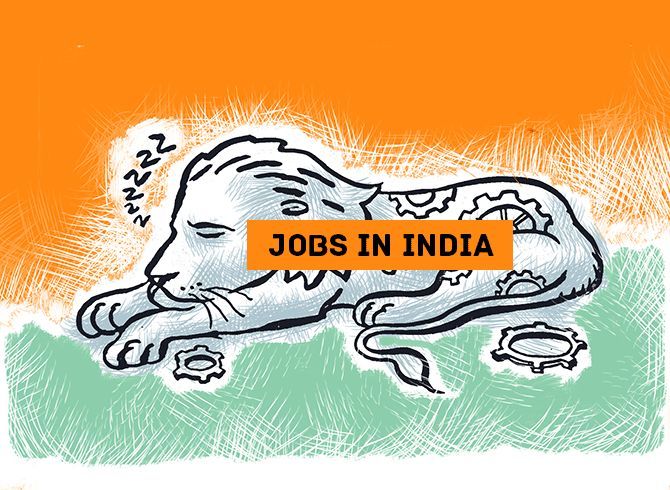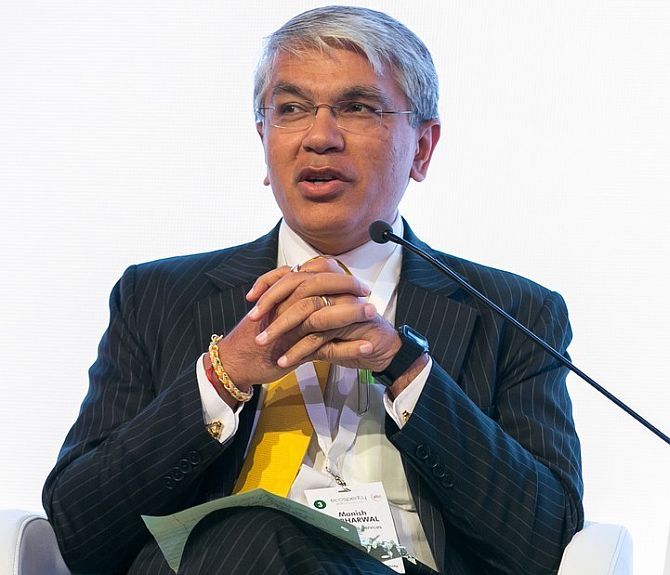'You can't take jobs to people, you have to take people to jobs.'
Illustration: Dominic Xavier/Rediff.com

According to the India Skill Report 2019 prepared by Wheebox, PeopleStrong and CII in partnership with AICTE and the United Nations Development Program, employability increases from 37% to 47.38% in 5 years and 64% of employers have a positive outlook on hiring and expected to be 15% higher than last year.
Young people should "focus on soft skills as in today's world, soft skills like communication, grooming, curiosity and working in a team are much more valuable than hard skills," Manish Sabharwal, chairman and co-founder of India's leading staffing company, Teamlease Service Ltd, tells Rediff.com's Shobha Warrier.
Recent reports suggest there is a huge rise in recruitment in the IITs this year. Also, IT companies like TCS are planning to recruit fresh engineering graduates in the thousands which had stopped in recent years. Does this mean the job market in India is finally looking up?
I think so.
Not only in IT, but across the job spectrum, I see a rise.
IT constitutes only 0.7% of India's labour force and it contributes only 8% of GDP.
In the last few years, it had slowed down a little bit as they were adjusting to the new business models all over the world.
I am willing to bet that the IT employment in India will go up from 3.5 million to 7 million over the next five years.
The gloom and doom which was overdone about IT will be over soon.
India has the same switching costs in IT like China has in manufacturing.
India produces more engineers than the US and China combined.
So, the people supply chain of India in IT is unbeatable and many companies are expanding.
Is it because the US economy is doing well that Indian IT companies are also on a recruitment drive?
I don't think that is the reason.
Every company is a technology company now; everybody uses cloud, analytics, social media, etc.
How you do customer service, customer acquisition, how you build brands, etc is using technology -- whether it is Caterpillar which has a huge software centre in India or Bauche, a manufacturing company but has 20,000 people in India doing technology.
Mercedes is not a car company in India; it has more than 5,000 people writing code.
It is a combination of the global economy looking up and also because of the structural change in India.
Every company is a technology company today.
You said IT constitutes only 0.7% of India's labour force. In which sector do you see growth happening?
The largest and fastest growing jobs in India are in sales, customer service and logistics, and it is all domestic consumption.
India is a domestic-driven economy unlike China which is a manufacturing export driven economy.
India has IT which services the globe but it is a very small percentage of the labour force.
Non-farm employment force in India is almost 50%. And farm is 50% of the employment force even now.
How do you explain the growth in sales, customer service and logistics areas?
That is because domestic consumption is increasing.
As per capita income increases, domestic consumption also increases.
Somebody's expense is somebody else's income!
That's why leading companies are investing in smaller towns.
Do you feel the initial negative effects of demonetisation and hiccups connected to the implementation of GST are over?
Not only the short-term pain is over, but the long-term growth has begun.
6 million new enterprises in India are registered for indirect taxes after GST.
You have to understand that from Independence till 2017, we only had 6 million enterprises paying any form of indirect taxes.
Now, we have 12 million enterprises registered for GST.
It is not that all these new 6 million enterprises will become large employers or large companies, but the odds of India having high productivity companies have improved quite substantially.
That is because there is a formalisation of the Indian economy.
We have 40 million new social security players and 6 million new enterprises.
India has also jumped around 70 points globally in the ease of doing business. Is it because of this that we have 6 million new enterprises?
I think so.
But India is still quite a hostile habitat for entrepreneurs but less hostile than it used to be.
It is still a difficult place to do business, but it has improved a lot.
Unfortunately, the birth of our country was built with the hot word that the private sector was not considered the engine of job creation.
Now, it has changed and formalisation is working.
If we continue the course for a few more years, the ease of doing business will improve considerably.
When we spoke more than a decade ago, you said the reason to start Teamlease was because there was a labour market transition happening from farm to non-farm, rural to urban, unorganised to organised, self-employment to wage employment and informal to formal...
Yes, in these years, all the sectors except farm to non-farm has done well.
But today, so many experts are of the opinion that it is not advisable to move from rural to urban or unorganised to organised or self-employment to wage employment or informal to formal, and this is not the way Indian economy should be growing...
I totally disagree with this opinion.
I don't think we have a job problem, what we have is a wages problem.
Everybody who wants a job has a job, but they do not get the wages they want or they need.
Our official unemployment rate is only 6%.
We have a wages problem because our enterprises are informal and not productive.
We have 63 million enterprises in India.
12 million of them do not have an office. 12 million work from home.
Only 1 million pay social security.
Just 18,500 companies have a paid-up capital of more than 10 crores.
So, 63 million enterprises mean nothing if only 18,500 have a capital of more than 10 crores.
Most of our enterprises are informal and they are dwarfs and not babies.
They are small and stay small.
That's why is important.
Otherwise, they will remain unproductive and those that are not productive will not be able to pay wages.
It is the typical chicken and egg problem.
The only way to solve the chicken and egg problem is turn vegetarian.
You do something different.
Doing something different is, formalise, urbanise, industrialise, financialise and we also need human capital.
These are the solutions.
I do not agree with the economists who think otherwise.

They say India still lives in its villages and it is not right to turn villages into cities...
We have 6 lakh villages and 2 lakh of those villages have less than 200 people living there.
We have only 52 cities with more than a million people.
China has 375 cities with more than a million people.
So, we need more cities.
We should not define urbanisation as shoving more people into Delhi, Mumbai and Bangalore.
We should define urbanisation as building 100 more cities with more than a million people.
So, you agree with the concept of creating smart cities?
Yes. I am of the opinion that not one prime minister but 29 chief ministers matter, and more than 29 chief ministers, 100 mayors matter; not the kind of mayors you have right now.
We need mayors like the mayors of London or New York.
We need decentralisation of functions and funds and functionaries to cities.
You can't take jobs to people, you have to take people to jobs.
Today, how do you take jobs to UP or Bihar, for example?
In China, for the New Year, 200 million people take train to go home.
The only place where a similar thing is happening is in Kerala. 9.5% of Kerala's population is Biharis and Kerala sends 10% of its population to the Middle East.
Chhath is a uniquely Bihari festival and you see all these Biharis taking a train to go home.
So, Kerala is taking people to jobs rather than jobs to people.
And you don't have a choice too.
It is reported that among the fastest growing cities in the world, 17 of them are from India.
Is it a good sign, according to you as there are many people in India who are against the concept of smart cities? According to them, urbanisation is not the answer to India's growth.
I don't think India will defy economic gravity.
In fact, India is not exempt from economic gravity.
I am sure Gandhiji also would have changed his opinion that India lives in its villages by now.
I am of the opinion that socially, politically and economically, cities are better for the people at the bottom of the pyramid.
Cities are more inclusive than villages socially, politically and economically.
The India Skill report 2019 found that 64% of the employers have quite a positive outlook on hiring. Do you agree?
Yes, I do.
Structurally, India is becoming less hostile to job creation every year.
Cyclical winds, which were there two years ago, also is moving away.
So, structurally and cyclically, the job outlook is much better.
What will be your advice to young people who are looking for jobs?
Focus on soft skills as in today's world, soft skills like communication, grooming, curiosity and working in a team are much more valuable than hard skills.
In a world where Google knows everything, knowing is not as important as your ability to learn how to learn.











